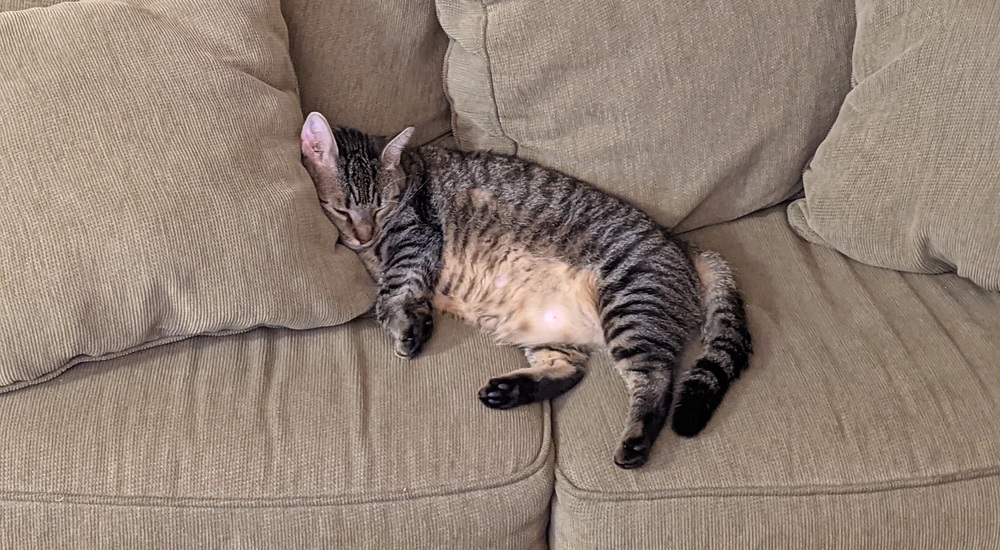This post is dedicated to Naz, our outdoor cat turned indoor queen.
So you found a beautiful cat outside and have made the decision to take her into your home and treat her as a member of your family. Your first steps are probably along the lines of establishing a good relationship with her via food. Second, you need to accommodate her other needs, such as using the bathroom.
Outdoor cats aren’t used to litter boxes, they’re used to dirt and leaves. They don’t understand the concept of a box, and they might not understand what this box filled with odd smelling litter is for.
Luckily for us, Naz knew almost immediately what it was. But if your outdoor friend doesn’t, here’s some tips and tricks that may help you.
Choose Litter Properly
The first thing you will want to do is make sure the litter in the litter box makes sense to your cat. Clay litter, while common, isn’t something most cats are used to if they live outside. This can make it difficult for them to understand it’s purpose. There’s some natural items you probably have in your house that can help transition them to standard clay litter. Check out our post on common litter alternatives to get a sense of what they are.
We recommend adding some potting soil or general dirt to your cats litter for the first few sessions. We would also recommend unscented cat litter, as the smells of scented litters can be rather strong for cats, and it will probably be a deterrent for an outdoor cat.
Make The Litter Box Attractive
In a pinch you can use an aluminum cooking pan as a litter box (we’ve had to do it before), but don’t expect this to hold up. If anything, it will probably scare your cat when it makes noise. Your best bet is to pick up an open top litter box, at least in the beginning. Or, you can just leave the top half of your litter box open.
This allows your cat to see what’s going on inside the box before they enter and will hopefully intrigue them. In general, it’s probably a good idea to avoid flaps on litter boxes that allow for entry and exit. Yes they hold the smell, but there’s other ways to avoid a bad litter box smell. And your cat can get trapped in a litter box with a flap, and that will certainly deter them from ever using it again.
Keep The Litter Box Clean
Your outdoor cat is not used to a dedicated bathroom, and they probably will not enjoy the prospect of urinating next to their feces. Add that to the knowledge that cats have a much better sense of smell than we do, and maybe you can understand how important it is to keep the litter box clean for them.
During your first few weeks, you should try to clean their litter box right after they use it, to ensure that it stays clean and they can really solidify the habit of using a litter box. After the first few weeks, you can just clean it once a day, that should be more than enough if you have a single cat household.
Try Different Places
Sometimes cats will avoid certain areas of a home or apartment for no apparent reason. They’re weird, what can we say. And sometimes you think you’ve done your cat a favor by placing their litter box in some genius place only to find they avoid it. Experiment with the placement of the litter box to see if where it is is the actual reason they are not using it as intended.
We wrote a post on where to place a litter box in an apartment, so be sure to check it out for tips and inspiration on this matter.
Positive Rewards
After your outdoor cat successfully uses the litter box it’s time to reward them with some sort of cat treat or at least some praise. Give them lots of pets or food so they know that they did something good.
You need to do this immediately after they use the litter though, or they will have a hard time associating the reward with their action.
What To Avoid
A few tips for those who may have other ideas for how to get their outdoor cat to use a litter box:
- Don’t punish them for peeing on furniture, use other things to deter them from repeating the behavior
- Don’t push their head in their urine - they will only learn to resent you
- Have patience - they are used to nature, not your weird plastic contraption
- Go slow - no one learns in a day, same goes for cats
Conclusion
Cats are naturally inclined to use a litter box because they are clean creatures. If they have an accident, consider it to be an accident. And if they are peeing on your rug it means they haven’t found or don’t understand that there is a better place for them to go.
Help them learn by making their bathroom space more appealing to them. And if that doesn’t work, treats usually do.

